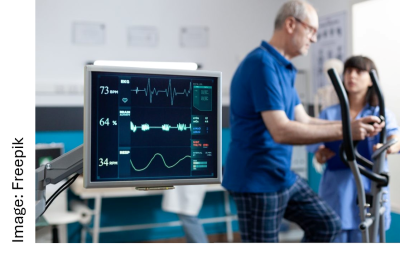Neurodiversity information for parents and young people
About stress echocardiograms
An echocardiogram or ‘echo’ is a scan that uses ultrasound (sound waves) to produce pictures of the heart.
The scan is painless and does not use radioactivity.
A stress echo involves making the heart work harder, either with physical exercise or using medication, and assessing how the function of the heart changes during stress.
Alternatives to a stress echocardiogram
Other imaging investigations are available. These include a CT scan, MRI scan or nuclear imaging. Your doctor has decided that a stress echo is the most appropriate for you. Ask your doctor if you have any questions about this.
Why you might need this procedure
Stress echocardiography is often used to investigate possible angina (chest pain due to coronary heart disease). It is a good way to see whether there is an adequate supply of blood to the heart muscle at rest and during stress.
It can also be used to assess certain heart valve problems.
It helps your doctor make the diagnosis and decide what treatment or intervention we can offer you.
Symptoms that can lead to you having this procedure
You may have experienced chest pain or breathlessness.
How a stress echo is carried out
- We ask you to remove your clothes from the waist up and put on a hospital gown.
- We measure your height and weight.
- We attach stickers to your chest to monitor your heart rate and rhythm.
- We may need to insert a cannula (drip) into a vein in your arm to give you some medication or harmless coloured dye during the test. The dye is called ‘contrast’. It helps us to see details of your internal structures more clearly during an ultrasound.
- A cardiac physiologist or doctor takes some baseline pictures of your heart. They do this using an ultrasound probe with some cool-feeling gel on your chest. They may also use harmless coloured dye (‘contrast’) injected through a vein to get clear pictures of your heart.
- During the scan, the room will be darkened so the echo images can be seen more clearly.
- We continuously monitor your heart rate. Your blood pressure will also be measured at regular intervals.
- After the first set of pictures has been taken while you rest, we ask you to walk on a treadmill or pedal on an exercise bike. We ask you to walk or cycle steadily (usually for 5 to 10 minutes at a gradually increasing workload). This means we can scan when your heart rate reaches a pre-defined target. We encourage you to make a good effort to reach the pre-defined heart rate.
- Several sets of echo pictures may be taken during the test.

What happens if you are not able to walk or pedal
- If you are not able to exercise, we inject some medication (called dobutamine) into a vein in your arm instead. This makes your heart work in the same way that it does during exercise (it beats harder and faster).
- In this situation, we ask you to lie on your left side on the echo couch while the doctor takes the echo images. After the initial set of pictures has been taken, the dobutamine will be started. Every few minutes the dose will be increased. Sometimes a second medicine (called atropine) is used to help increase the heart rate to the target level.
- When your heart rate has reached its target level and all the required pictures have been taken, we will stop the medication. We will then monitor you until your heart rate has returned to normal.
- We remove the cannula and all monitoring equipment.
- We send result of the test to your doctor and your GP.
Where the stress echo takes place
The stress echo is performed in the Cardiology Department, Level 3 of the Outpatients block, on the same level as the main hospital entrance.
How long you will be in hospital
The test takes about 1 hour in total. After the test we may ask you to sit in the waiting room for 15 minutes to make sure you have fully recovered before you go home.
Potential risks and side effects
Use the drop-down menus to find out more about potential risks and side effects.
Stress echocardiography is an extremely safe procedure. The risks are as follows.
- Rarely (around 1 in 1000 patients), the stress medicine can cause the heart to develop an abnormal rhythm. This usually settles when the medicine is stopped, but sometimes it requires additional treatment. A doctor will discuss this with you.
- Rarely (less than 1 in 2000) a patient can have a bad angina attack or heart attack during the test.
- Rarely (less than 1 in 10,000) a patient can develop an allergic reaction to the ‘contrast’ dye (if used).
![]()
Let the doctor know, before the test begins, if you are allergic to any medications.
- You may not feel anything unusual during the test.
- It is common to feel a tingling sensation in your scalp, head, or neck. You may be aware of your heart beating more strongly and faster when we give you the stress echocardiogram medication.
- Sometimes people feel dizzy or sick.
- These symptoms resolve quickly when we stop the medication.
What are the expected benefits of treatment?
This is a diagnostic test, not a treatment. The information we obtain can help your doctor plan future treatment with you.
How to prepare before you come to hospital
Do the following 48 hours before your stress echocardiogram.
- Stop taking any beta blocker medication (atenolol, bisoprolol, metoprolol, propranolol, nebivolol and carvedilol) unless you are told otherwise by your doctor.
- Stop taking calcium-channel blocker medication (diltiazem and verapamil).
- Stop taking the angina drug ivabradine.
We ask you to stop taking drugs because they prevent the stress medicine from increasing your heart rate. If you continue taking these medications in the 48 hours before the test, your stress echo may need to be moved to a later date.
Continue to take all your other medication as prescribed by your doctor.
If you have questions about your medication, contact your GP or the echo department (see Contacts section).

- Do not eat anything during the two hours before the test.
- Wear comfortable, flat, secure-fitting shoes on the day of the test.
What happens when you go home
- Do not operate heavy machinery or drink caffeinated drinks for the rest of the day.
- If we have given you dobutamine during your stress echo, we strongly advise that you do not drive yourself home.
Contact information
Kingston Hospital Echocardiogram department
Telephone: